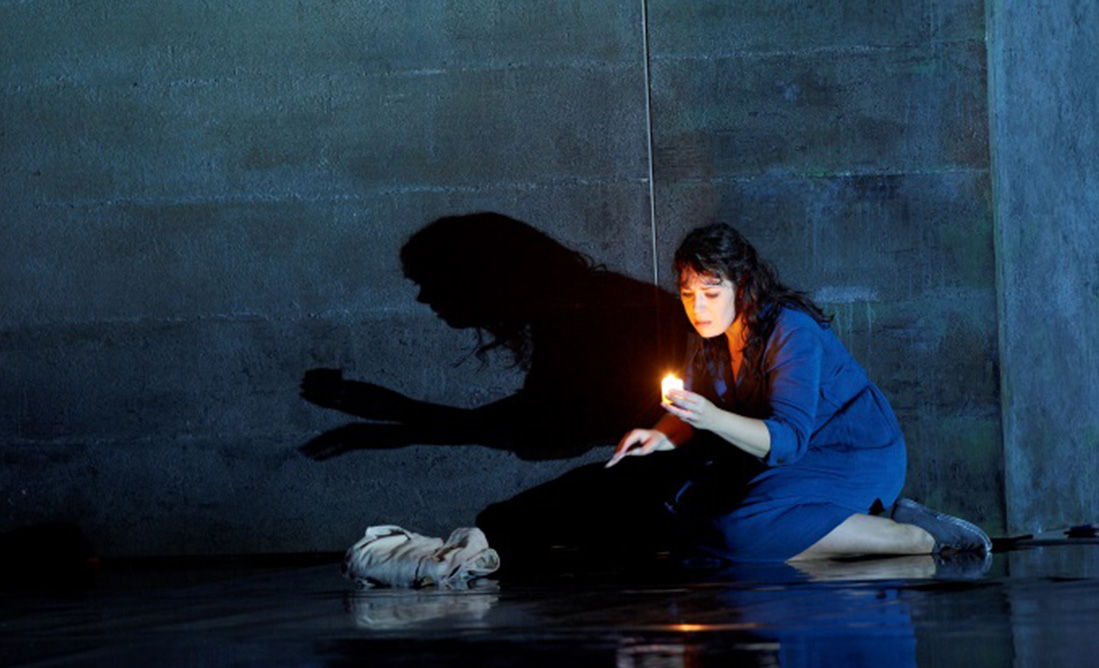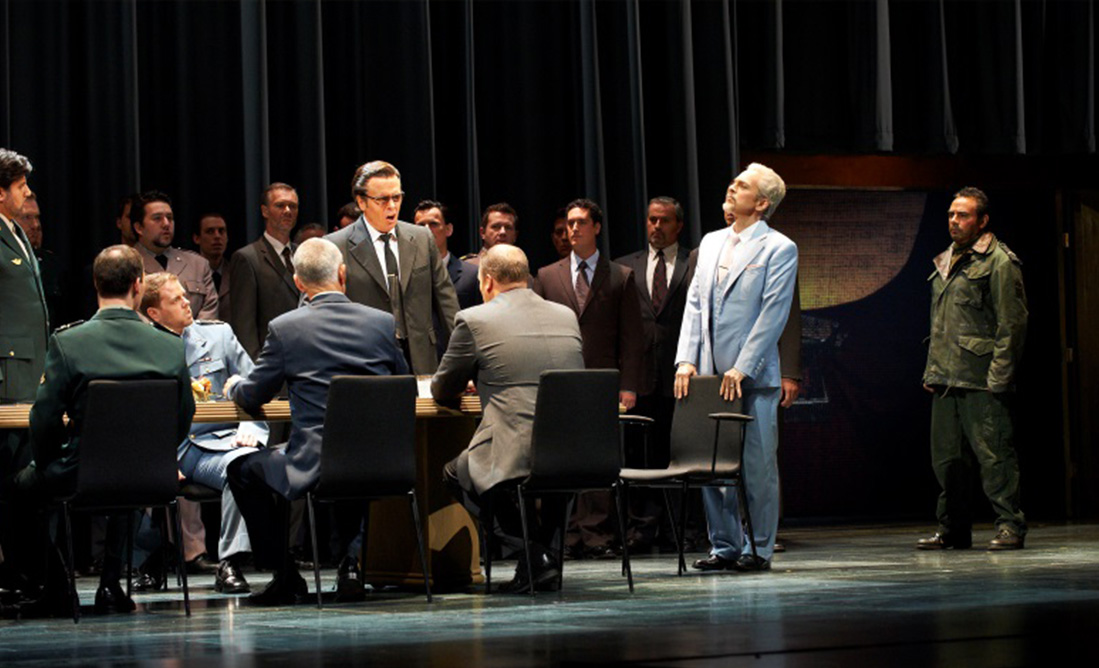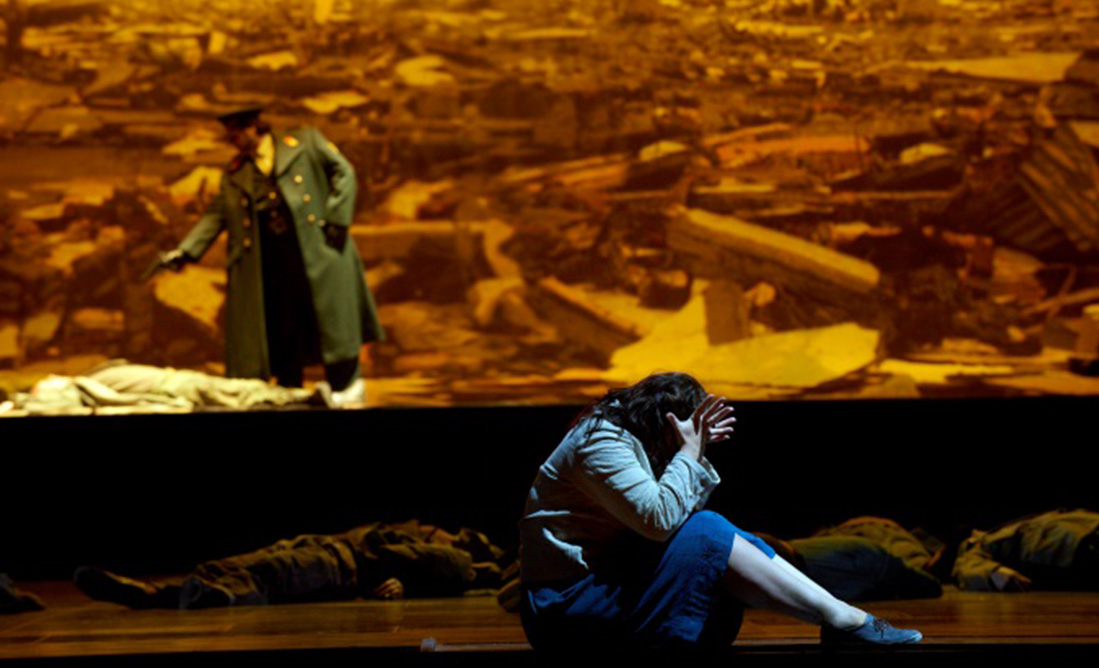AIDA
Giuseppe VerdiDue to the ongoing COVID-19 pandemic, all upcoming performances have been cancelled. For more information and to explore ticketing options, click here.
#COCAida
What makes Aida so special?
Giuseppe Verdi is a giant in the world of opera; Aida is one of his most famous works, with a plot reminiscent of Romeo and Juliet.
As a war rages on, Princess Aida has fallen in love with Radames — but he’s a general for the enemy’s army, poised to lead an attack against Aida’s father. She has to make an impossible choice: should she embrace her new, young love or defend her father and homeland? While Aida is often portrayed with opulent gold-draped dancers, pyramids, and elephants, the opera is at its core an intimate story.
When this Tim Albery-directed production premiered in 2010, it raised a few eyebrows precisely because it stripped down Aida’s typical pageantry to focus on the tale’s emotional heart. Almost ten years later, Albery’s ahead-of-its time vision is due for a revisit.
“This is definitely not your pharaoh’s Aida.”
—Associated Press
Sung in Italian with English SURTITLESTM
Conductor Jader Bignamini
Director Tim Albery
Set Designer Hildegard Bechtler
Costume Designer Jon Morrell
Lighting Designer Thomas C. Hase
Choreographer Laila Diallo
Price Family Chorus Master Sandra Horst
Aida Tamara Wilson
Radames Russell Thomas
Amneris Clémentine Margaine
Amonasro Roland Wood
Ramfis Goderdzi Janelidze
King of Egypt Richard Wiegold
Messenger Matthew Cairns
Priestess Simona Genga
Production originally made possible in part by
Tim & Frances Price
With the COC Orchestra & Chorus
Production Sponsor

THE STORY
Aida is a captive slave princess in the Egyptian court. She shares a secret love with the warrior Radames, who in turn is desired by the Egyptian princess Amneris. When Aida’s father, King Amonasro, is captured as well, he asks Aida to help him find out Radames’ battle plans. Aida is successful and Radames is accused of treason and sentenced to be buried alive in a tomb. Aida joins her lover in death, leaving Amneris haunted and heartbroken.
SYNOPSIS
ACT I
A conference room
Egypt is at war with Ethiopia. Ramfis tells Radames that an invasion has begun.
Radames hopes that he is named to lead the Egyptian army into battle, despite the fact that he is in love with the Ethiopian slave Aida.
Amneris, the daughter of the King, who herself loves Radames, begins to suspect that he may love Aida.
Once news of the full scale of the Ethiopian invasion arrives, Radames is appointed commander of the army. Aida is left appalled by her conflicting emotions: her longing that Radames should return victorious and her desire that her father Amonasro, the Ethiopian king, and his army should reach Thebes to set her free.
The Temple of Vulcan
The men ready themselves to go into battle.
ACT II
Amneris’ private rooms
Amneris extracts from Aida the truth of her feelings for Radames, by observing Aida’s grief as she tells her that Radames has died on the battlefield, and her joy when she hears that this was a lie and that he is alive and victorious. Amneris orders Aida to follow her to the celebrations.
The victory celebration
Radames is welcomed home as a hero. The King offers him anything he wants. Radames asks that the Ethiopian prisoners be admitted.
Among them is Amonasro. Aida rushes to her father, but he warns her not to reveal who he is. Pretending to be only an officer, he tells the King that Amonasro died in battle and begs him to show mercy by releasing all the captured Ethiopians. Radames asks the King to agree to this. Ramfis persuades the King that, if he must free the prisoners, he should at least keep Amonasro and his daughter Aida captive as a surety of peace.
The King agrees and then, to Radames’ and Aida’s horror, offers Radames his daughter’s hand in marriage.
INTERMISSION
ACT III
Outside the Temple of Isis
Ramfis leads Amneris to a night of prayer before the day of her wedding. She longs to believe that Radames truly loves her.
Aida has agreed to meet Radames in secret. Amonasro has followed her and forces her to accept that she should help save her country from the Egyptian army by extracting their invasion plans from Radames. He hides as Radames arrives.
Despite his impending marriage to Amneris, Radames tries to persuade Aida that once he has conquered Ethiopia he will be able to persuade the King to allow him to marry her. Aida dismisses this fantasy, and eventually persuades him they have no choice but to escape to Ethiopia. So they can avoid the invading forces, he tells her the route they will travel. A
delighted Amonasro appears, and Radames realizes that he has been deceived. Amneris and Ramfis return to discover Radames’ treachery. He allows Amonasro and Aida to escape, and is arrested.
ACT IV
Outside Radames’ cell
Amneris pleads with Radames to defend himself at his trial. She says she will ask the King for clemency, if he renounces Aida. Radames refuses. He is taken to his trial. Amneris, left alone, hears him refusing to defend himself. He is sentenced to a traitor’s death: he is to be entombed alive.
An underground chamber
Radames is left in the darkness to die. He discovers that Aida has hidden herself in the chamber.
She persuades him to accept the inevitability of their death, to welcome their release from the sorrow of life.
Alone, Amneris prays that she will find peace.


.jpg?w=300&h=300&c=3)




(Top to bottom, left to right): All production photos from the Canadian Opera Company's production of Aida, 2010, Sondra Radvanovsky as Aida; scenes from the Canadian Opera Company's production of Aida, 2010; Rosario La Spina as Radames (background) and Sondra Radvanovsky as Aida (foreground); All photos: Michael Cooper.
Verdi’s Aida. Leontyne Price (Aida), Jon Vickers (Radamès), Rita Gorr (Amneris). Sir Georg Solti, conductor, with the Orchestra del Teatro dell’Opera di Roma, 1962. Decca
Fatal Attractions: Reviving Tim Albery's Aida
When this Tim Albery-directed production premiered in 2010, it raised a few eyebrows precisely because it stripped down Aida’s typical pageantry to focus on the tale’s emotional heart. Almost 10 years later, Albery’s ahead-of-its time vision is due for a revisit.
OPERA INSIGHTS
The Grandeur of Verdi’s First Finale
Wednesday April 1, 2020, 7 p.m.
Don Mills Library, 888 Lawrence Ave E, North York
Verdi thought Aida would be his last opera — and while it turned out his masterpieces Otello and Falstaff were still to come, Aida nonetheless stands as a high point of his career, praised for its melding of French Grand Opera with the melodic drive of the Italian tradition. In advance of the Canadian Opera Company’s staging this spring, this session will highlight the elements that make Aida arguably the grandest of Italian Grand Operas.
Free program, please call 416-395-5710 to register.
-
Sung in Italian with English SURTITLESTM
CAST AND CREATIVE TEAMS
Conductor Jader Bignamini
Director Tim Albery
Set Designer Hildegard Bechtler
Costume Designer Jon Morrell
Lighting Designer Thomas C. Hase
Choreographer Laila Diallo
Price Family Chorus Master Sandra Horst
Aida Tamara Wilson
Radames Russell Thomas
Amneris Clémentine Margaine
Amonasro Roland Wood
Ramfis Goderdzi Janelidze
King of Egypt Richard Wiegold
Messenger Matthew Cairns
Priestess Simona GengaProduction originally made possible in part by
Tim & Frances PriceWith the COC Orchestra & Chorus
Production Sponsor

-
THE STORY
Aida is a captive slave princess in the Egyptian court. She shares a secret love with the warrior Radames, who in turn is desired by the Egyptian princess Amneris. When Aida’s father, King Amonasro, is captured as well, he asks Aida to help him find out Radames’ battle plans. Aida is successful and Radames is accused of treason and sentenced to be buried alive in a tomb. Aida joins her lover in death, leaving Amneris haunted and heartbroken.
SYNOPSIS
ACT I
A conference room
Egypt is at war with Ethiopia. Ramfis tells Radames that an invasion has begun.
Radames hopes that he is named to lead the Egyptian army into battle, despite the fact that he is in love with the Ethiopian slave Aida.
Amneris, the daughter of the King, who herself loves Radames, begins to suspect that he may love Aida.
Once news of the full scale of the Ethiopian invasion arrives, Radames is appointed commander of the army. Aida is left appalled by her conflicting emotions: her longing that Radames should return victorious and her desire that her father Amonasro, the Ethiopian king, and his army should reach Thebes to set her free.
The Temple of Vulcan
The men ready themselves to go into battle.
ACT II
Amneris’ private rooms
Amneris extracts from Aida the truth of her feelings for Radames, by observing Aida’s grief as she tells her that Radames has died on the battlefield, and her joy when she hears that this was a lie and that he is alive and victorious. Amneris orders Aida to follow her to the celebrations.
The victory celebration
Radames is welcomed home as a hero. The King offers him anything he wants. Radames asks that the Ethiopian prisoners be admitted.
Among them is Amonasro. Aida rushes to her father, but he warns her not to reveal who he is. Pretending to be only an officer, he tells the King that Amonasro died in battle and begs him to show mercy by releasing all the captured Ethiopians. Radames asks the King to agree to this. Ramfis persuades the King that, if he must free the prisoners, he should at least keep Amonasro and his daughter Aida captive as a surety of peace.
The King agrees and then, to Radames’ and Aida’s horror, offers Radames his daughter’s hand in marriage.
INTERMISSION
ACT III
Outside the Temple of Isis
Ramfis leads Amneris to a night of prayer before the day of her wedding. She longs to believe that Radames truly loves her.
Aida has agreed to meet Radames in secret. Amonasro has followed her and forces her to accept that she should help save her country from the Egyptian army by extracting their invasion plans from Radames. He hides as Radames arrives.
Despite his impending marriage to Amneris, Radames tries to persuade Aida that once he has conquered Ethiopia he will be able to persuade the King to allow him to marry her. Aida dismisses this fantasy, and eventually persuades him they have no choice but to escape to Ethiopia. So they can avoid the invading forces, he tells her the route they will travel. A
delighted Amonasro appears, and Radames realizes that he has been deceived. Amneris and Ramfis return to discover Radames’ treachery. He allows Amonasro and Aida to escape, and is arrested.
ACT IV
Outside Radames’ cell
Amneris pleads with Radames to defend himself at his trial. She says she will ask the King for clemency, if he renounces Aida. Radames refuses. He is taken to his trial. Amneris, left alone, hears him refusing to defend himself. He is sentenced to a traitor’s death: he is to be entombed alive.
An underground chamber
Radames is left in the darkness to die. He discovers that Aida has hidden herself in the chamber.
She persuades him to accept the inevitability of their death, to welcome their release from the sorrow of life.
Alone, Amneris prays that she will find peace.
-

test dessc
.jpg?w=300&h=300&c=3)
-




(Top to bottom, left to right): All production photos from the Canadian Opera Company's production of Aida, 2010, Sondra Radvanovsky as Aida; scenes from the Canadian Opera Company's production of Aida, 2010; Rosario La Spina as Radames (background) and Sondra Radvanovsky as Aida (foreground); All photos: Michael Cooper. -
Verdi’s Aida. Leontyne Price (Aida), Jon Vickers (Radamès), Rita Gorr (Amneris). Sir Georg Solti, conductor, with the Orchestra del Teatro dell’Opera di Roma, 1962. Decca
-
Fatal Attractions: Reviving Tim Albery's Aida
When this Tim Albery-directed production premiered in 2010, it raised a few eyebrows precisely because it stripped down Aida’s typical pageantry to focus on the tale’s emotional heart. Almost 10 years later, Albery’s ahead-of-its time vision is due for a revisit.
-
OPERA INSIGHTS
The Grandeur of Verdi’s First Finale
Wednesday April 1, 2020, 7 p.m.
Don Mills Library, 888 Lawrence Ave E, North YorkVerdi thought Aida would be his last opera — and while it turned out his masterpieces Otello and Falstaff were still to come, Aida nonetheless stands as a high point of his career, praised for its melding of French Grand Opera with the melodic drive of the Italian tradition. In advance of the Canadian Opera Company’s staging this spring, this session will highlight the elements that make Aida arguably the grandest of Italian Grand Operas.
Free program, please call 416-395-5710 to register.
2019/2020 season creative: BT/A
_20240704163452_0.png)
